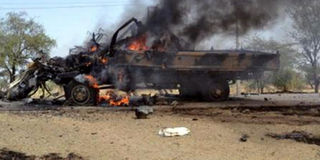Prime
Blasts hit two Nigeria bus stations, at least 27 dead

A vehicle used by Boko Haram set ablaze by Nigerian troops near the town of Baga, north-eastern Nigeria on February 23, 2015. AFP Photo
What you need to know:
Roughly four hours later, two men blew themselves up after getting off a bus at a busy terminus in Kano, the north's largest city and another frequent Boko Haram target. Ten people were killed
Kano (Nigeria) (AFP) -
Two blasts rocked bus stations in embattled northern Nigeria on Tuesday, killing at least 27 people, as relentless attacks persist less than five weeks from general elections
The first, which killed 17 people was caused by a bomb that ripped through a station on the outskirts of Potiskum, in northeast Yobe state, which has been targeted repeatedly by Boko Haram Islamists.
Roughly four hours later, two men blew themselves up after getting off a bus at a busy terminus in Kano, the north's largest city and another frequent Boko Haram target. Ten people were killed.
The Nigerian militant group has been blamed for more than 13,000 deaths since 2009 and has in recent weeks expanded its uprising into neighbouring countries, raising fears of a regional crisis.
In Niger on Tuesday, a mine planted by the insurgents killed two soldiers and injured four others in the Diffa region bordering Yobe, a security source said.
Niger this month joined Cameroon, Chad and Nigeria in a joint operation aimed at crushing Boko Haram's uprising, and many expected the Islamist rebels to launch cross-border reprisals.
Nigeria had hoped the four-nation offensive could contain the violence before elections initially scheduled for February 14 but which were postponed by six weeks because of the insurgency.
But with the bloodshed continuing on a nearly daily basis, security fears remain high ahead of the March 28 vote.
- 'Huge explosion' -
The Potiskum explosion occurred at the Tashar Dan-Borno motor park on the outskirts of the city immediately after a man put a bag in the boot of the bus and then tried to board.
"The bus had just loaded with passengers on its way to Kano when a huge explosion happened inside the bus at exactly 11:40 am (1040 GMT)," said a driver's union official at the bus station.
Potiskum was also attacked on Sunday, when a young girl detonated explosives strapped to her body at a crowded market.
Thirteen dead and 31 injured were initially brought to Potiskum General Hospital after Tuesday's blast, according to a nurse at the facility, but she added: "Four more died here.
"So, we have 17 dead and 27 people with injuries."
The drivers' union official said it was not immediately clear whether the man who placed the bag in the boot was a suicide bomber, or whether the explosives were hidden inside it.
Rescue workers at the scene said that all 12 people on board the bus were killed.
The girl in Sunday's attack which left seven people dead in Potiskum was thought to be as young as seven, according to multiple witnesses.
Boko Haram Islamists have increasingly used young girls and women as human bombs at so-called "soft targets" such as markets and bus stations, which are hit regularly.
- Flesh and blood 'splattered' -
The explosion at the Kano Line Station occurred at about 3:40 pm (1540 GMT) and sent people rushing from the site of the blast, many of them covered in blood.
"I was attending to customers when I heard a loud explosion that shook the building," said one local shopkeeper, who works opposite the terminus.
An orange seller inside the bus station confirmed his account.
"We rushed outside and we saw plumes of black smoke coming from the Kano Line Station," the shopkeeper said.
"People and buses were rushing out of the bus station. One bus was splattered with blood and human flesh."
Kano state police spokesman Musa Magaji Majia described the attack as "suicide explosions" by two men after they got off a bus from Wudil, about 40 kilometres (25 miles) away.
"Ten people were killed in the blast and several others were wounded.
"The area was cordoned off and then bomb experts swept the place for more explosives but nothing was found," he told reporters.
Both bombings again underlined the severe security challenges confronting Nigeria in the run-up to the March elections.
Nigeria and neighbouring armies have claimed major successes in the campaign against the Islamists, but Boko Haram has proved resilient.
But promises of an imminent end to the insurgency have proved empty in the past.
Nigerian President Goodluck Jonathan has admitted that he and his government underestimated the threat posed by the militants in the early days of the insurgency.
His administration is facing intense domestic and international pressure to hold the vote on March 28, with the United States and others warning against subverting democracy on security grounds.



